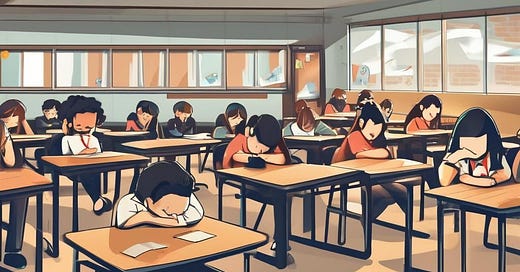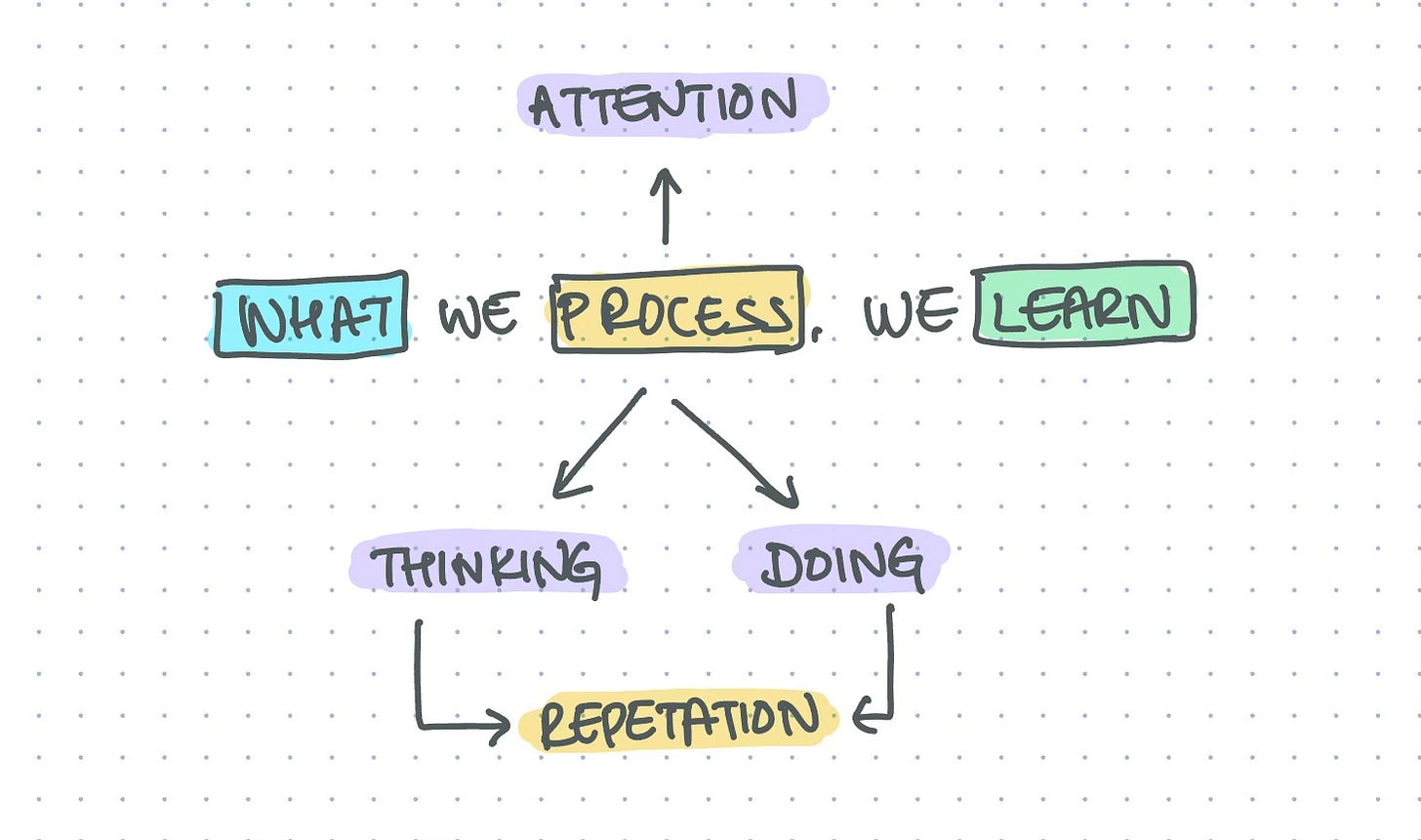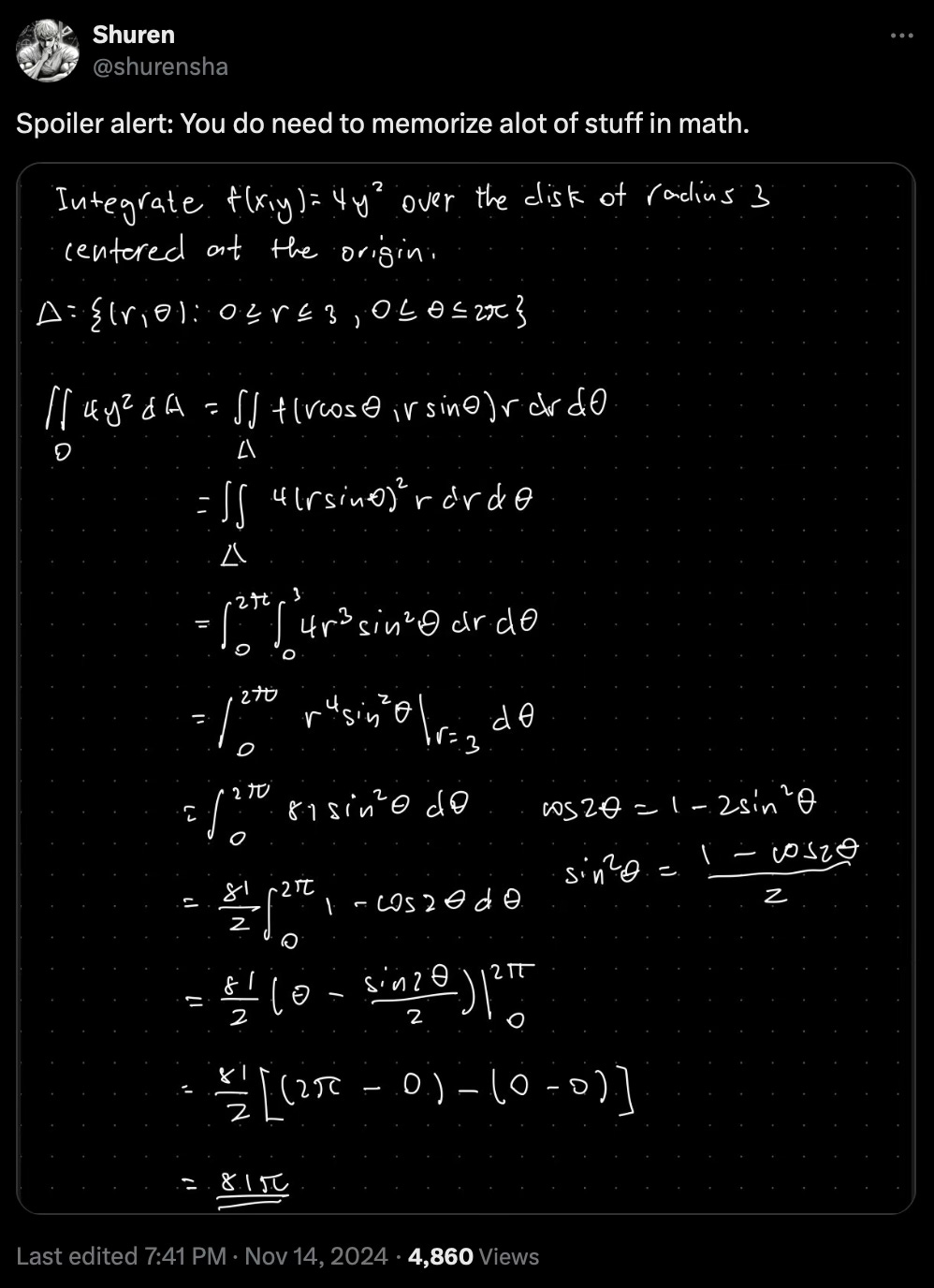1. Fluency in Math heavily depends on Memorization
“Imagine trying to do this stuff correctly and reasonably quickly without having memorized your trig identities, integral rules, unit circle, times tables...
When you have automaticity on these foundational skills it feels like moving puzzle pieces around -- but when you don't, each puzzle piece is a heavy weight, and you struggle to move them at all, much less figure out where they're supposed to go.”
Memory is a huge component of learning, not just math. So, a difficult challenge for all teachers is: how to help students memorize essential facts, concepts, ideas meaningfully so that they can be fluent and accurate while performing any skill?
One solution, given by Dan Willingham is to make students think deep about content and the process both. Why? Because, as he wrote, “Memory is the reside of thoughts.” Students are likely to remember what they have been thinking about during the learning process.
2. Is Boredom a School Problem?
Many students have complained about the boring class, the boring subject, the boring teacher. Those could be legit reasons.
However, is there a missing side to their boredom?
Here’s Justin Baeder,
“Boredom is partly an attitude/personality problem. Certainly, school can be boring because it’s unchallenging. It can also be boring just because it’s not taught in an interesting way. But notice something funny: other equally smart students in those same classes were not bored!
Attitude plays an underappreciated role in boredom.
What’s more, a bad attitude towards school has a negative impact on your learning:
If you think you already know everything, and your teachers are idiots, and therefore you have no choice but to be bored. You’re going to get less out of your education, and have less fun, than if your attitude isn’t rotten.
Another underappreciated cause of boredom is wasted time due to bad peer behavior. We owe it to students to not waste their time and keep things on track.
We can address all of those factors and still have bored students, though. And you can tell who’d have been bored no matter what based on how they act as adults.
Some people are just misanthropes. Some people are just narcissists. Of course they’d find constant excuses to be bored.
Improving schools won’t change that.”
In the past, whenever I felt that students were bored in the class, I would quickly pick an “energizer activity” from my classroom activities pool and make students “active” again. I must confess that I have no idea how many hours of classroom learning I have wasted for nothing.
Of course, the reason for their boredom could have been my teaching style, the content, or the program. And of course, I must have been hard on myself. It could have been their personal reasons and attitude towards the world.
3. Minimal Guidance does work but…
Yes, the word “but” because like Dylan Wiliam says, everything works in teaching… we just need to know ‘under what condition’.
This seminal paper by Krischner, Sweller, and Clark argues that,
“minimally guided instruction, such as discovery learning, inquiry-based learning, problem-based learning, and constructivist learning, is ineffective because it ignores the limitations of human cognitive architecture, specifically working memory.”
The keyword: ineffective
They continue,
“guided instruction is more effective and efficient than minimally guided instruction due to its ability to reduce cognitive load and support the formation of knowledge structures in long-term memory, especially for novice learners.”
The two phrases “guided instruction” and “minimally guided instruction” create a bit of confusion. Therefore I prefer to say “explicit instruction” instead of “guided instruction”.
And thus we can conclude: Explicit instruction is more effective and efficient for novice learners because of it reduces cognitive load and supports meaningful learning.
Three major insights for teachers:
Implement direct, explicit teaching, rather than minimally guided instruction, when teaching novice to intermediate learners. Explicitly teach students what to do and how to do it. (Don’t let them ‘discover’ knowledge and skills right away.)
Provide extensive guidance to novice learners who lack prior knowledge in long-term memory to prevent unproductive problem-solving search. As learners gain expertise, gradually decrease this guidance. (Check my earlier post on it.)
Be mindful of the negative effects of minimally guided instruction. Students taught with unguided methods may develop incomplete or disorganized knowledge, and may even acquire misconceptions about the subject matter.
(For more, click here.)
Here’s a quick recap:
Memorization is an essential process for long term learning. It builds fluency and accuracy.
Some students come with boring attitude and personality, which is something you as a teacher can’t control.
Explicit Instruction is the most effective and efficient approach for novice learners.
Alright, happy teaching and happy learning.







Automaticity is key for fundamentals of any discipline. Creates room for problem solving
In the UK, we have - in my opinion - outrageous expectations of young writers and the list of skills/features their writing should include. It takes so much breaking down and explicit instruction of these skills, one by one and across the whole year, to get these right.